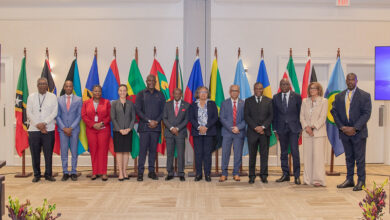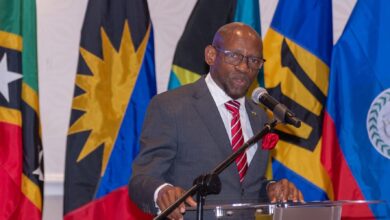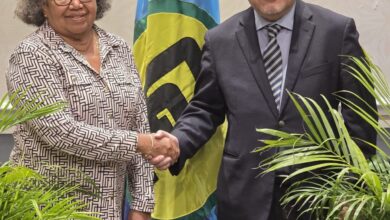It is my pleasure to welcome you to this Meeting of the Council for Foreign and Community Relations (COFCOR). This annual gathering is the opportunity for the Ministers of Foreign Affairs to look back and take stock of the multiple activities undertaken by the Community in the promotion and protection of its interests. It also provides the occasion to look forward to the prospects by analysing the trends, developments and events which shape the external environment in which our Member States operate.
This review and analytical exercise take on particular importance this year as the final touches are being put to the Five-Year Strategic Plan for the Caribbean Community which will be presented to the Heads of Government at their Conference in July. That Plan will lay out the Community’s priorities over the period as we seek to focus on a few practical and achievable goals. The emphasis on prioritisation applies to all Councils, including the COFCOR, as it seeks to position the Community advantageously in the international arena.
As small states, multilateral diplomacy is of prime importance to the Caribbean Community in pursuit of the protection and promotion of the interests of our Member States. In view of the rapidly evolving international geopolitical situation, CARICOM has sought to re-orient its external relations to take account of the dynamics on the global and hemispheric stage. The Community has taken into account the narrowing of the interests of its traditional partners in their relations with us. We are therefore actively seeking to widen our own geopolitical space by establishing links with an array of non-traditional partners and forming strategic alliances where there is a convergence of interests.
Among the characteristics of the current international environment are the profound systemic changes taking place and the resulting transformations in the balance of power, as well as the fast pace of change and the increasing complexity arising from what has become a multipolar world. These new layers of complexity, and at times the resulting divergent interests, render the Community’s efforts at coordination of foreign policy challenging but even more necessary.
As the term multipolar suggests, there is now a multiplicity of centres of power and influence. The US remains a major, some may even argue, indispensable global actor. It is still the foremost military power; the health of its economy, the largest in the world, still matters to the global economy, and the “soft power” of American cultural forms is unrivalled. Emerging from its economic stagnation, the EU remains another major centre of political and economic influence. The influence of the BRICS, (Brazil, Russia, India, China and South Africa) on the global economic system is increasing along with their strategic weight. Among the BRICS, China is a rising global power with a number of forecasts predicting that it could eventually overtake the USA as the most powerful global economic power. It has been aggressively expanding its economic and financial outreach to various regions of the world, including Latin America and the Caribbean.
In addition to the countries just mentioned, there are other actors whose influence cannot be underestimated for economic, financial or strategic reasons. A revitalised African, Caribbean and Pacific (ACP) group of countries and the increasing weight of the African Union are two areas of strategic importance. The Japanese economy is starting to stir after an extremely long period in the doldrums. Turkey and South Korea also have dynamic economies, with the former embarking on a more open foreign policy outreach seeking to benefit from its strategic geographic location as well as being a model of democratic governance in a turbulent and volatile Middle East.
There are the Gulf States with their enormous sovereign wealth funds looking for high return investments. I would mention also Singapore. In many ways it is a model of the success that the knowledge economy and emphasis on long-term planning, innovation, creativity and entrepreneurship can achieve for a country that has no natural resources but has been able to build on its strategic location and human resources. We in the Caribbean Community can learn quite a lot from their experience and their way of doing things. The visit last July, at the invitation of the Foreign Minister, was a refreshing experience. I have no doubt Ministers that the lessons drawn from that visit will inform the review that you will be undertaking at this Meeting.
Increasing regionalization and the establishment of interest-oriented groupings add other poles of influence as well as another layer of complexity as does the host of non-state actors as well as the new media. Through globalization, this new world has become increasingly inter-connected, as we see with issues such as climate change, pandemics, terrorism and migration to name but a few.
Given that background, while maintaining our traditional links, the scope for our Community to develop new partnerships is extremely wide with a great diversity of sources of relations, trade, investment, technical cooperation and of development assistance. Already, we are transforming our relationship with Latin America as we have come together bilaterally, collectively and institutionally through arrangements such as the Association of Caribbean States (ACS) and, more recently, the Community of Latin American and Caribbean States (CELAC), PetroCaribe and the Bolivarian Alternative (ALBA). Individual CARICOM Member States are also active members of the Central American Integration System (SICA) and the Union of South American Nations (UNASUR).
The Community’s relations with individual Latin American states such as Brazil, Chile and Mexico have been strengthened. In late April the Community held its Third Summit meeting with Mexico and looks forward to the proposed Summit with Brazil. On my recent visit to Chile, Her Excellency President Bachelet assured me of her country’s desire to strengthen its co-operation with the Community. These evolving relationships have increased the level of mutual understanding and also resulted in Latin American countries becoming increasingly sensitive to the peculiarities and vulnerabilities of Small Island Developing States such as ours.
The issues surrounding small states will be the focus of attention at the Third International Conference on Small Island Developing States scheduled for Samoa in September of this year. The Conference theme, “Sustainable Development of Small Island Developing States through Genuine and Durable Partnerships” is most apt for the Community which is facing multiple sustainable development challenges – low growth rates, high debt burdens, rising unemployment, decreasing access to development financing and susceptibility to increasingly intensified natural disasters.
Our presence in Samoa should be substantial, as that Conference seeks a renewed political commitment by all countries to address effectively the special needs and vulnerabilities of SIDS by focusing on priorities for their sustainable development in the elaboration of the Post-2015 Development Agenda. Critically, it will also examine practical and pragmatic actions for the further implementation of the Barbados Plan of Action (BPOA) and the Mauritius Strategy.
Madame Chair, Honourable Ministers, it is clear that CARICOM’s Foreign Policy agenda is packed. In seeking to prioritise, you have sought the inputs of three resource persons representing foreign policy practice, academia and economics, to give you different perspectives. That retreat, later today, presents the opportunity for an in-depth discussion on “CARICOM Foreign Policy in the Changing Global Environment” in order to recommend foreign policy approaches and priorities. It is a discussion that I look forward to against the backdrop of a complex world and a Community in the process of change.
I thank you.






